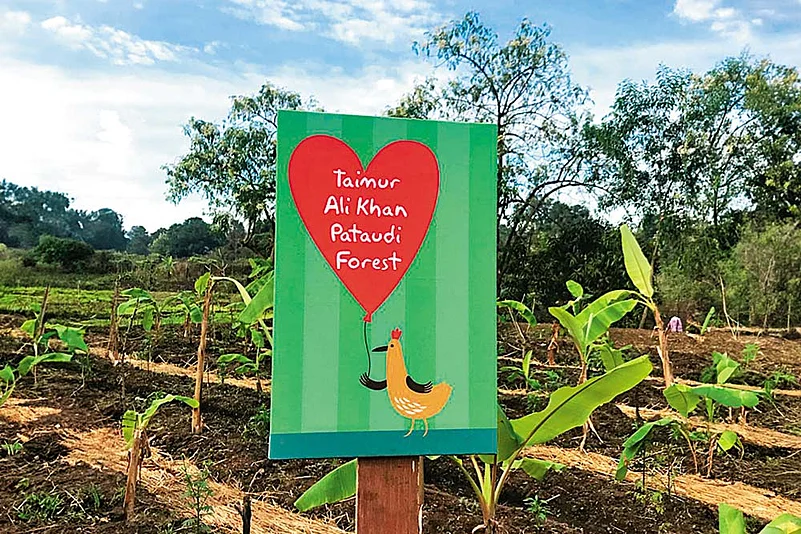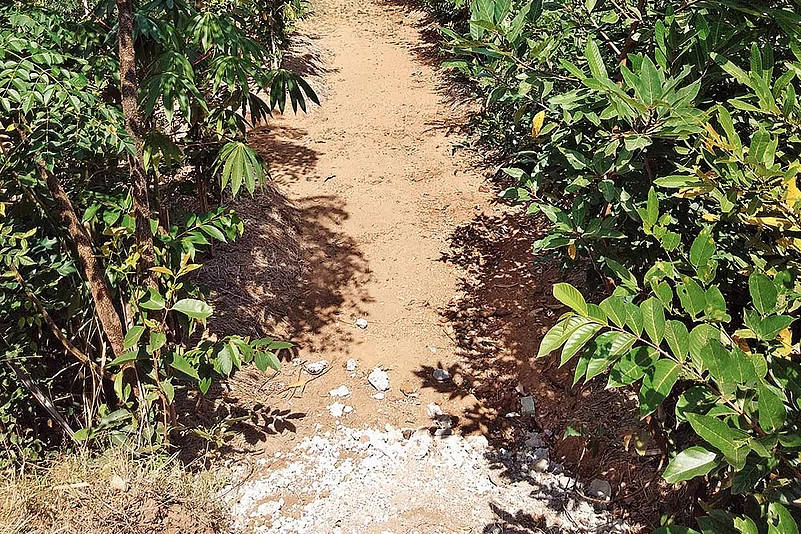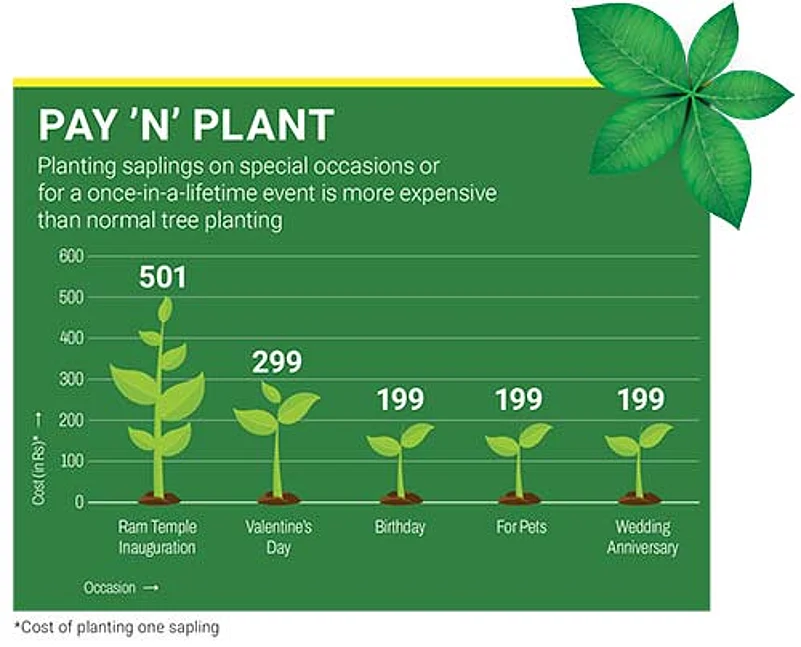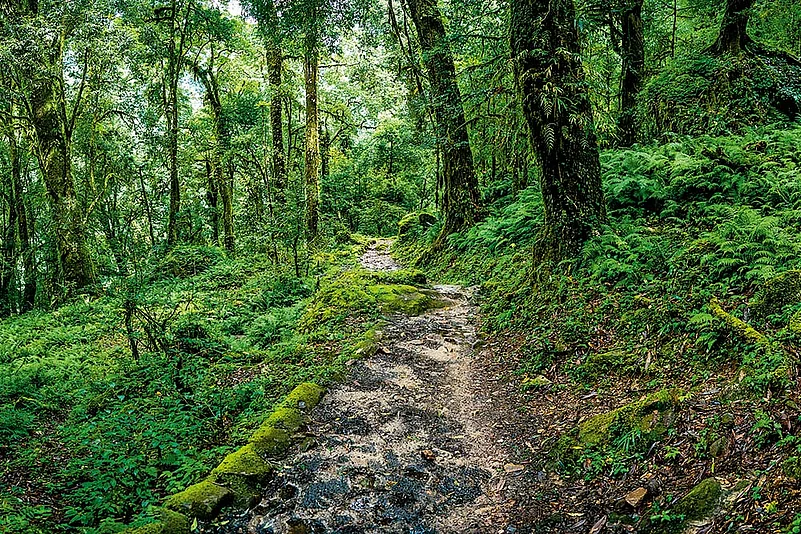On the northern outskirts of Mumbai, a red heart is painted on a green board. On the heart is written Taimur Ali Khan Pataudi Forest. The board is on the edge of a forest that actor Kareena Kapoor Khan had planted when her son Taimur turned one in 2017.
Mumbai-based dietician Rujuta Diwekar had helped Khan in creating this green patch. Diwekar wrote on Instagram: “The forest has about 100 trees on a 100 sq ft plot. The trees are as young as Taimur, even younger, actually each of them is a local, native, climate resilient species…”
It is not only celebrities who are going green. Take the example of Delhi-based artist Smriti Chaturvedi Shankar who has planted saplings to mark her son’s birthday. “I planted a few trees in farmlands with the help of farmers. It is a way of giving back to nature,” she says.
Planting trees is trending and entrepreneurs have sniffed a business opportunity. Not just birthdays but also on Valentine’s Day and Women’s Day. A popular tree-planting website, recently, offered to plant trees on the occasion of the pran pratishtha ceremony of the Ram temple in Ayodhya. The site charges Rs 199 for a single sapling and Rs 14,925 for 75 trees for birthdays. Prices are bumped up on occasions such as Valentine’s Day—Rs 299 for one and Rs 2.99 lakh for 1,000 trees. Planting for a once-in-a-lifetime event is more expensive.
Business is Booming
India Inc. too has taken up tree planting in a big way. Clients include companies that have active corporate social responsibility (CSR) funds, want to meet environmental, social and governance (ESG) compliances and chase carbon credits.
“Companies are increasingly publishing sustainability reports to communicate their environmental and social performance to stakeholders,” says Nidhi Singh, chief executive and co-founder of Pune-based tree-plantation company Grow Billion Trees.

The company has catered to clients such as CarDekho, Tata AIG Insurance, Pernod Ricard and Concept Public Relations among others.
According to Satender Kumar, chief operating officer and co-founder, Grow Billion Trees, there are three kinds of forestry—the first in which the produce goes to farmers and is mostly funded by companies through their CSR initiatives; second is managed by plantations for private companies and individuals, paid for by the corporate or individual, where the produce goes to them; and the third type where government and forest land is used for biodiversity, paid for by corporates.
Some of the current project locations for agroforestry by Grow Billion Trees are in West Bengal, Maharashtra, Jammu and Kashmir, Andhra Pradesh, Haryana and Rajasthan among others.
The tree-plantation sector being relatively new, data regarding the number of companies and the market size is hard to come by. But as government spending has increased, a corresponding growth in the number of firms is only to be expected.
The Ministry of Environment, Forest and Climate Change through the Compensatory Afforestation Fund Management and Planning Authority (CAMPA) had approved Rs 8,980.04 crore to state authorities in 2021–22, up from Rs 7,467.49 crore in 2020–21 and Rs 6,771.59 crore in 2019–20.
Since these funds are disbursed for compensatory afforestation when trees are chopped because of infra projects, they create opportunities for tree-plantation companies. Subhendu Sharma, founder and director of Afforestt, says that since such companies like his do not have to acquire land for planting trees, they can be in profit if they manage their affairs well. “We did not need a lot of investment to start our company. We were frugal and bootstrapped. It has been 13 years now and we have a presence in 16 countries. Whoever is doing this business professionally is making money,” he says.
Pledge to Plant
Like the government, India Inc. too is doing its bit to check deforestation. In 2020, the World Economic Forum (WEF) launched the 1t.org initiative to support the UN Decade on Ecosystem Restoration (2021–30), in which it plans collaborative efforts from diverse industries dedicated to conserving, restoring and cultivating a trillion trees by 2030. The WEF claims that over 100 global companies have committed to planting more than 12 billion trees spanning 100-plus countries.
In January 2024, Bharat Heavy Electricals (BHEL) and the RPG Group committed to be part of 1t.org. "The RPG Group aims to grow trees in the regions we work in—Maharashtra, Gujarat, Tamil Nadu, Telangana, Madhya Pradesh, West Bengal and Rajasthan. We aim to add to the green cover in the region and find ways to maximise benefits to the community as well as the environment," RPG had said in a statement.

On the other hand, BHEL has set a target of conserving approximately 30 lakh trees and planting two lakh saplings on the premises of some of its manufacturing units.
The Mahindra Group is also part of the 1t.org initiative and practises social forestry through Project Hariyali in the Araku area of Andhra Pradesh. Under Project Hariyali, the group has planted over two crore trees between 2007 and 2022.
Afforestt’s Sharma, who claims to have created 138 forests in 44 cities in 10 countries, says, “In the conventional landscaping, you see palm trees planted in a row or manicured lawns in shopping malls and gated communities. But people are becoming aware of the benefits of native trees. As aesthetic sensibilities change and environmental awareness increases, I think all these spaces are going to be converted into either forest planted using the Miyawaki method or landscaping.”
The Miyawaki technique is fast catching on. It is based on the tenets popularised by Japanese botanist Akira Miyawaki, in which native species are planted close to each other, which develop a symbiotic relationship and grows faster than a regular forest by as much as three times. In India, both private individuals and green entrepreneurs have become its advocates.
The Delhi government and the city’s civic body have been working on developing empty and abandoned spaces on the Miyawaki technique since 2020.
TVS Industrial & Logistics Parks, a logistics giant, has built a Miyawaki forest around its premises in Tamil Nadu. “Our annual reports provide comprehensive insights on performance and strategies of sustainability initiatives, including the Miyawaki method,” says Manikandan Ramachandran, the company’s chief operating officer. He adds that his organisation has spent roughly Rs 1 crore setting up a Miyawaki forest in its premises.
Xynteo, a consultant, has teamed up with Grow Trees in its efforts to protect the environment. “We have taken part in their Trees for Leopards project in Nainital. We also planted 350 trees on behalf of the participants who attended one of our events,” says Vipul Kumar, senior partner, Xynteo.

Benefits of Going Green
The credits earned by planting trees can be traded in the carbon markets which has become a financial incentive for tree-planting initiatives. According to Global Market Insights, the carbon credit market was valued at $103.8 billion in 2023 and has a potential of compound annual growth rate (CAGR) of 14.8% in 2024–32.
Grow Billion Trees’ Kumar highlights the conventional revenue sources that a forest creates, like selling high-quality timber and sales made through fruit production, honey-keeping and agro-tourism. His colleague Singh says, “Ecotourism generates employment in hospitality, conservation, carbon auditing, carbon finance management, ESG analysis and climate risk and sustainability data analysis.”
Anirban Mukherjee, lead for climate and sustainability in India at BCG, a consultant, feels that it is important to differentiate between growing and nurturing trees as a social initiative, as against developing it as a business proposition. “Younger generations are increasingly eco-conscious and are propelling demand for sustainable products and services. Companies are also progressively adopting ESG practices, making tree planting a popular option for offsetting carbon emissions and fulfilling CSR goals,” he says.
A joint study of the WEF and PwC concluded in a report Nature Risk Rising: Why the Crisis Engulfing Nature Matters for Business and the Economy in January 2020 that "$44 trillion of economic value generation—more than half of the world’s total GDP—is moderately or highly dependent on nature and its services, and therefore exposed to risks from nature loss." All this means there is a market for forestry.































